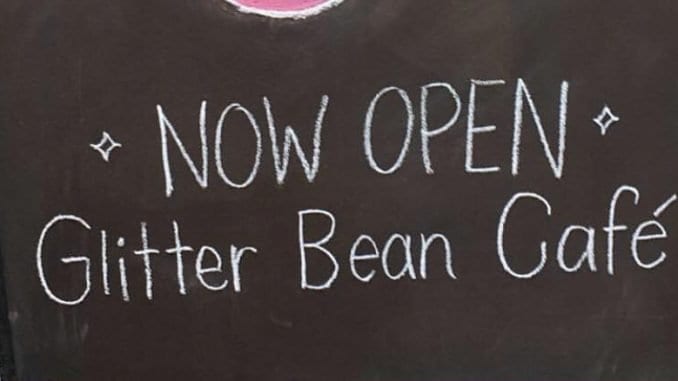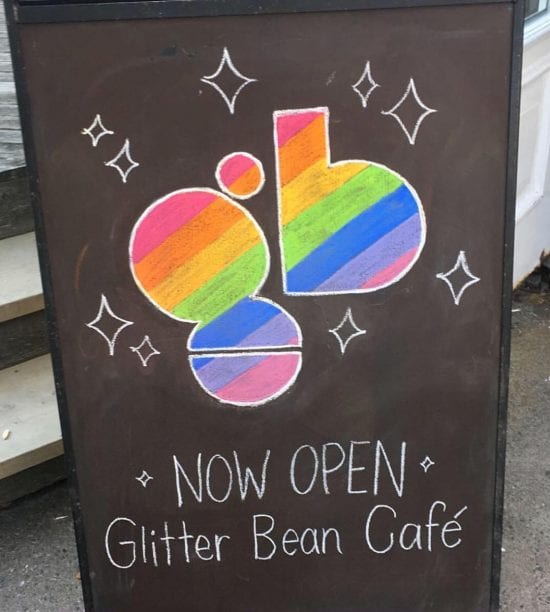
Glitter Bean Coffee in Halifax, Nova Scotia, is an explicitly queer and trans coffee space. We learn more about the collective and its goals for creating friendly spaces for marginalized identities.
BY ASHLEY RODRIGUEZ
BARISTA MAGAZINE ONLINE
Photos courtesy of Glitter Bean Coffee
The baristas of a coffee shop in Halifax, Nova Scotia, were being underpaid and treated poorly by management. So what did they do? Along with the support of their community, they booted out their bosses and started Glitter Bean Coffee, a collectively run space highlighting the voices of QTBIPOC folks. In this interview, member Charlie Huntley shares how Glitter Bean began, and the goals and vision for an explicitly queer- and trans-centered space.
Ashley Rodriguez: How would you describe Glitter Bean Coffee? What are the store’s goals and vision?
Charlie Huntley: Glitter Bean Cafe is a worker-owned café union-cooperative run by mostly queer and trans folks whose goal is to center and hold a safer space for queer and trans folks and BIPOC (black, indigenous and people of color). We are explicitly queer, but not exclusive; we are open to the public more broadly.

AR: You took the café over after the former owner stopped paying you—can you tell us more about that story?
CH: We were struggling against our former employer for a few months. Our paychecks were bouncing and at first he was repaying us and claiming it was a logistical failure, but eventually he stopped paying us full amounts of what we were owed. We reached out to the workers of his other cafés that were unionized and they were having similar struggles, so they held a vote to join the union so they could have access to legal representation and have access to a greater network of solidarity.
Eventually he racked up so much debt to his coffee provider, and our former boss and the leaseholders of the building we’re in, Just Us! Coffee Roasters Co-op, that they came and locked the doors. The next day we met with our union, the Service Employees International Union (SEIU) Local 2, to discuss the possibility of us opening the café ourselves as a cooperative with a union model; all nine of us were in, so we went from there. Just Us! offered us subsidized rent (for the space and equipment), the SEIU provided some funding, and the workers had a bit of funding too (mainly a surprise RESP that one of the workers never intended on using) that we used to cover our start-up costs. Opening a queer-centered, worker-owned space has been a desire (and joke) for our customers and us for years, but as low-wage workers we haven’t had the funding to pull it off. So it remained a joke until our former boss got booted out.

AR: Why is it important to center QTBIPOC? How do you incorporate that goal in your store (through messaging, signage, hiring folks and increasing representation, etc.)?
CH: It’s important to us to hold space for QTBIPOC folks because there is currently one gay bar in Halifax, and there is a huge gap for publicly used QTBIPOC space. But it is also very difficult for queer and trans and BIPOC folks to find work here in Halifax. We’re treated as more disposable than our white, straight, cis, settler counterparts. We’re the last hired and the first fired, so it was very important for us to provide stable employment for folks who hold those identities, and a union provides protections to workers to be able to speak out to their bosses in the face of workplace injustice. So, although we’re a cooperative, we still think unions are important to protect workers, and we’re excited to have a rare worker union-co-op model.
We provide space for queer and trans and BIPOC folks to host their art, to host events, read queer literature from our library, and generally socialize. We’ve incorporated what we think is a queer aesthetic—i.e., a glitter wall, pink, turquoise, and gold accents, a store sign with glitter. Customers have the option of adding rainbow colors and edible glitter to their drinks, which has been A LOT of fun to make and see the glee it gives customers.

AR: How do you tackle issues of discrimination both behind the bar and through customer interactions?
CH: Providing a safer space is important. You can’t always predict what is and isn’t going to make a person feel safe, but we aim to shut down bigotry and intervene in oppressive situations. We’re prepared to ask people to leave when they are being harmful, and we take holding community space very seriously, as we hold a lot of power, being one of the few queer spaces in town. We don’t want to treat people like they’re disposable when somebody has done something harmful, so we’re prepared to have conversations with folks who are willing to be accountable for their harm before banning them from the space.
AR: What do you want people to feel when they come in? What has the community response been like?
CH: The compliments are abundant and we’ve gotten many bouquets of flowers, presents, and cards. It’s been overwhelmingly positive. Every other customer who came through our doors for the first two weeks congratulated us, but I think the best feeling is when there are young queer and trans folks who express how happy they are to finally have a space for them to socialize, organize, and celebrate in.

AR: You folks are part of a union and you own the shop as a cooperative—what has that been like? How do you divide up tasks, and how do you spread out responsibilities among the group?
CH: Between the board (three people), our manager, and full-timers, we get a lot of work done! We split up and share the work of ordering and managing emails and events. The board’s treasurer deals with and manages the funds. The board and manager deal with health and safety of the workers and any other things that may pop up. We’ve all been working in cafés for years, so there have been some learning moments, but collectively we have the skills to run a cafe.
AR: Being in a cooperative probably challenges a lot of norms and ideas we’ve all been taught to believe about leadership—what are some of the myths and ideas you wish to dispel? What do you folks think your business stands as an example for?
CH: I think it’s important to acknowledge power and skills of low-wage workers. I think a lot of us (low-wage workers, and baristas in general) are looked down upon by the general public as not being smart or talented enough to be business owners or hold positions that are deemed more valuable, but we think that’s totally classist. Believe in workers’ power! I think the thing holding low-wage workers back the most is the lack of access to capital to start a business. If you’ve only worked low-wage jobs for a while, you likely don’t have a lot of savings, there’s a good chance you’ve got a lot of debt, and if you have bosses that are writing you bad checks (like ours) and not paying you on time, your credit is probably pretty bad too. It’s hard to get business loans in those conditions.

Another thing holding workers back is the trauma of capitalism—many of us are exhausted at the end of the day from having to endure bulls**t from our bosses, from the exhaustion of shifts that are too long, the erosion of our bodies (e.g., tendonitis, carpal tunnel, bad knees), and bosses who are negligent and abusive. These working conditions contribute to beating down your mental health and confidence required for taking over your workplace, or starting your own. We’d like to make clear that business owners get too much credit and workers don’t get enough.
AR: What do you think other coffee shops can learn from you? What’s something that’s been super easy to employ that you haven’t seen other shops do that you think they should or could?
CH: When you say coffee shops, do you mean owners or workers? I think the owners of coffee shops could learn how to treat their workers better. Wage theft is endemic, improper health and safety procedures are frequent, posting your schedules with enough time for workers to plan their lives would be great. Owners taking a cut of workers tips, and phasing workers out when they speak up against injustice, isn’t OK. Those are lessons owners can learn. As for baristas, I hope that they know that you don’t have to tolerate your bosses’ unfair treatment. You can organize yourselves, strategize how to make your workplace better, reach out to a union, bargain a contract that gives you better control of your schedule, control of your tips, etc., and take direct action when you’re fed up and think it’s strategic to do so.
AR: What do you want people to know about your team?
CH: We are badass as hell and have the most supportive work environment many of us have ever had. We hold space for each other in ways that I wish all workers did for one another. It’s part of why we held onto this place for so long through so much boss struggle; we didn’t want to let each other go as coworkers. We didn’t want capitalism to tear apart the community that we’ve built in our café just because the boss is gone. Luckily [when] the boss got booted out it didn’t mean we had to be torn apart from one another, as it so often does for workers.

